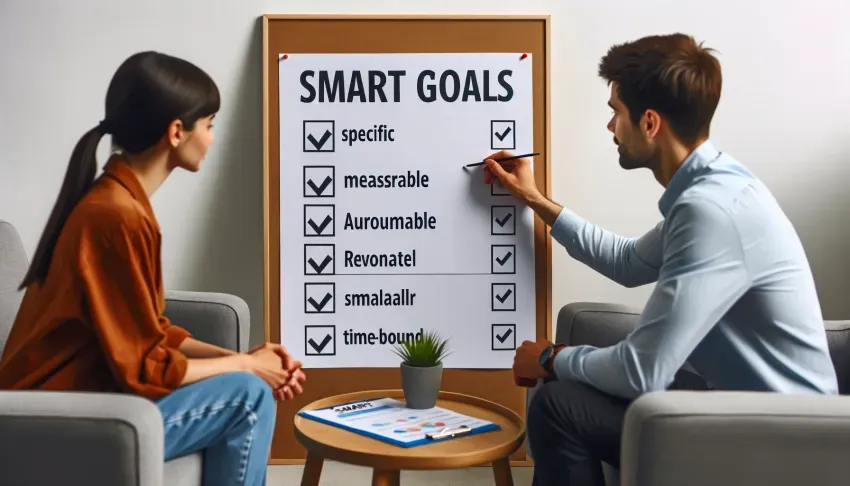Setting goals is an essential component of therapy, and using the SMART framework can be a helpful way to make sure that goals are relevant specific, and achievable. In this blog post, we’ll explore how SMART goals can be used in therapy and their benefits.
What are SMART goals?
SMART is an acronym that stands for Specific, Measurable, Achievable, Relevant, and Time-bound. Each of these components is essential for creating effective and achievable goals.
- Specific: The goal should be clear and concise, outlining precisely what the client wants to achieve.
- Measurable: There should be a quantifiable way to measure progress toward the goal.
- Achievable: The goal should be challenging but realistic and attainable.
- Relevant: The goal should be related to the client’s needs and desires.
- Time-bound: There should be a specific deadline for achieving the goal.
Benefits of using SMART goals in therapy
Using SMART goals in therapy can provide a variety of benefits for both therapists and clients. Here are a few of the key advantages:
Boosting self-efficacy is a crucial benefit of incorporating SMART goals in therapy. By achieving clearly defined, attainable goals tailored to their specific needs and desires, clients experience significant boosts in self-esteem and confidence, which are essential for their journey of personal growth.
Providing greater structure in counselling sessions becomes possible with SMART goals. They offer a clear and concise outline of what the client aims to achieve, simplifying the process of developing a targeted plan for reaching these goals, thereby making therapy sessions more productive and focused.
Supporting close collaboration that strengthens the therapeutic alliance is another advantage. SMART goals require clients to stay accountable to both themselves and their therapist, fostering a partnership based on mutual respect and a shared commitment to achieving the client’s objectives.
Fostering personal growth and progress, SMART goals encourage clients to concentrate their efforts on one specific goal at a time. This focused approach prevents them from feeling overwhelmed by multiple goals or issues, promoting steady advancement and personal development.
Providing a clear direction, the comprehensive framework of SMART goals offers an effective strategy for goal setting in counselling. This structure helps both the therapist and client navigate the therapeutic process with a defined roadmap.
Allowing clients to focus on areas that need improvement, SMART goals are inherently motivating. They provide a concrete endpoint to strive towards and a measurable way to track progress, which can inspire clients to tackle areas where they seek change.
Tracking progress and maintaining motivation become more manageable with SMART goals. They not only facilitate awareness of incremental achievements but also enhance focus, bolster persistence, energize clients, elevate self-worth, and foster hope, making the therapy journey empowering.
Facilitating awareness in therapy means that SMART goals have a broader impact than just on mental health. They can be instrumental in helping clients overcome depression and facilitate rehabilitation by bringing attention to the necessary areas of focus for improvement.
Enhancing persistence, and SMART goals reinforces the importance of perseverance in the therapeutic process. By improving self-efficacy and offering a structured approach to counselling, they support a collaborative effort that strengthens the therapist-client bond.
Energising clients through the sense of accomplishment and success associated with meeting SMART goals is vital. This sense of achievement motivates clients to engage more actively in the therapeutic process and take on new challenges with confidence.
Enhancing self-worth is a natural outcome of achieving SMART goals. As clients meet their objectives, the boost in self-esteem and confidence can significantly impact their overall well-being and outlook on life.
Engendering hope is critical in therapy, and SMART goals play a key role in this. By demonstrating that progress is possible and goals are attainable, they help clients stay accountable and optimistic about their future.
Empowering clients to take control of their therapeutic journey is perhaps one of the most significant benefits of SMART goals. They enable clients to focus their efforts effectively, achieving one specific goal at a time and applying these skills beyond the therapy sessions into their daily lives.
14 Steps Therapists can use SMART goals in therapy
Here are some steps therapists can follow to help clients create SMART goals:


Utilizing SMART goals in therapy transforms the counselling process into a guided journey of growth and improvement, deeply rooted in empathy and mutual respect. Here’s how therapists can weave these goals into their practice, touching upon all aspects of personal development and collaborative engagement.
Starting the therapeutic journey by identifying the client’s needs and desires is essential. Engaging with the client to explore the facets of their life they wish to enhance or alter lays the groundwork for meaningful change. This initial step involves a deep dive into understanding what aspects of their existence the client feels could benefit from transformation or improvement.
Once these areas are brought to light, the next step is to create specific goals. This involves helping the client articulate what they aim to achieve in a precise manner. An example might be setting an intention to enhance communication skills with a partner by mastering active listening techniques. Such specificity ensures that the goals have a clear focus and direction.
Making goals measurable is crucial for tracking progress. It involves establishing concrete metrics or indicators of improvement, such as maintaining a journal detailing reflections on conversations with a partner. This tangible evidence of progress is vital for maintaining motivation and gauging the effectiveness of the strategies being employed.
It’s also important to ensure goals are achievable. Goals should stretch the client’s abilities but remain within the realm of possibility. Setting an attainable goal, like attending a communication workshop and applying learned active listening skills in conversations with a partner, provides a realistic pathway to success, balancing challenge with feasibility.
Moreover, ensuring goals are relevant guarantees that they align with the client’s overarching desires and needs. For instance, honing communication skills should directly contribute to the broader objective of fostering a more robust and intimate relationship with a partner. This relevance ensures that each goal directly contributes to the client’s vision for their life.
Lastly, setting a deadline imbues the process with urgency and structure. Specifying a timeframe, such as aspiring to achieve improved communication within three months, offers a clear target date for accomplishment. Deadlines help to organize the effort and focus required, making the goal not just a desire but a commitment.
Engaging in Regular Reviews is fundamental. These ensure that the goals set forth at therapy’s outset continue to align with the client’s evolving circumstances, keeping the journey both relevant and geared towards attainable achievements.
Working as a Team underscores the essence of implementing SMART goals. Therapy begins with an open conversation about the client’s concerns, leading to the identification of targeted areas for improvement. This collaborative foundation paves the way for a strong therapeutic alliance, where goals are pursued with a shared commitment.
The necessity for Adjustments acknowledges the dynamic nature of personal growth within therapy. SMART goals offer a structured yet adaptable framework, allowing for the seamless integration of new insights and developments into the counselling process.
Enhancing Coping Skills through SMART goals addresses the need to refine the strategies clients use to navigate life’s challenges. It offers an opportunity to replace outdated mechanisms with more effective ones, tailored to the client’s current needs.
Setting Expectations is vital. Therapy involves navigating diverse expectations about what counselling entails. Transparent discussions about achievable outcomes help demystify the process and establish a realistic pathway forward.
Facilitating Behavioral Change represents a core objective of counselling. By breaking down this broad goal into specific, actionable steps, SMART goals lead to profound and lasting change, fostering a sense of achievement and progress.
Helping Improve Relationships through SMART goals aims at enhancing the client’s capacity for forming and maintaining meaningful connections. It focuses on nurturing skills like empathy, communication, and understanding, which are essential for healthy relationships.
Promoting the Decision-Making Process reflects the empowering aspect of counselling. SMART goals encourage clients to make informed choices, facilitating a sense of autonomy and confidence in their ability to shape their futures.
Customising SMART Goals:
The beauty of the SMART framework lies in its adaptability. Therapists must remember that every client’s journey is unique. Cultural sensitivities, personal backgrounds, and individual circumstances should always inform goal-setting. For instance, a goal related to family might look different for someone from a joint family system versus someone from a nuclear family background.
Challenges of SMART Goals in Therapy:
While SMART goals provide a robust framework, they’re not without challenges:
- Over-Specification: Being too specific might make some clients feel boxed in, limiting the organic flow of therapeutic progress.
- Overemphasis on Tangibility: Not all therapeutic goals are easily measurable. For instance, “feeling happier” is subjective and might not fit neatly into the SMART structure.
Tools and Resources for SMART Goal Setting:
Leveraging the right tools can greatly enhance the goal-setting experience:
- Goal-Setting Apps: Apps like Trello or Todoist can be customized for therapy-related goals, allowing both therapists and clients to track progress.
- Printable Worksheets: Therapists often use tailored worksheets that guide clients in breaking down their objectives into SMART goals. These can be particularly useful for visual learners.
- Journaling: Encouraging clients to maintain a journal can provide insights into their progress, feelings, and any obstacles they face.
Real-Life Success Stories:
Over the years, countless individuals have benefited from the structured approach of SMART goal-setting in therapy. Let’s explore a few:
Anna: Struggling with anxiety, Anna set a goal to “be less anxious.” Together with her therapist, they refined this into a SMART goal: “Attend bi-weekly yoga classes and practice 10 minutes of daily meditation for two months to reduce anxiety episodes by half.” This clear, measurable goal helped Anna find a path forward, and she proudly reported a significant drop in her anxiety episodes after eight weeks.
David: Facing communication issues in his relationship, David aimed to “improve communication with his spouse.” Through SMART goal-setting, this transformed into: “Attend three couples therapy sessions over the next six weeks and implement one new communication technique from each session in daily conversations.” The clarity provided by this goal made a tangible difference in David’s relationship.
The Importance of Regular Check-ins:

Consistent reassessment is the backbone of effective therapy. Goals might need tweaking as clients evolve and grow. Regular check-ins, whether monthly or quarterly, provide an opportunity to celebrate successes, understand challenges, and refine goals to ensure they remain relevant and achievable.
Closing Thoughts
SMART goals are an effective tool for goal-setting in therapy. By creating specific, measurable, achievable, relevant, and time-bound goals, therapists can help clients achieve success and improve their lives. Using SMART goals in therapy can provide clarity, motivation, accountability, focus, and a sense of success, making it an essential component of any therapeutic approach.
The Bohangar Private Practice champions SMART Goals in therapy, if you are seeking therapy why not reach out today using the contacts on this page






